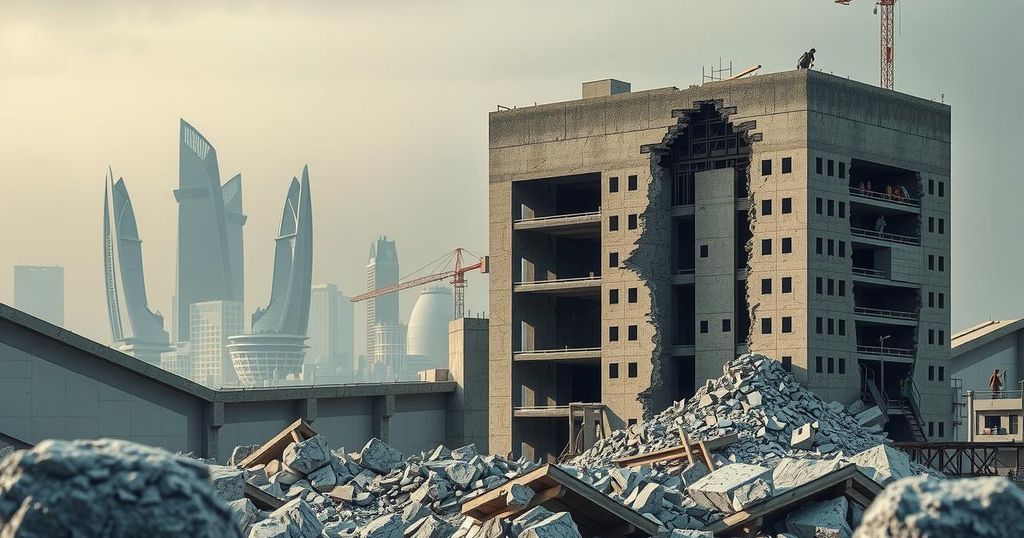Iran has rejected Israel’s claims of funding Hezbollah as attempts to disrupt Lebanon’s reconstruction post-conflict. Spokesperson Esmaeil Baqaei called for international intervention regarding escalating violence in the West Bank while reaffirming Iran’s commitment to holding Israeli leaders accountable. The article discusses various diplomatic maneuvers, including opposition to Trump’s relocation proposal for Gaza and support for options reflecting the Syrian people’s choices.
TEHRAN – Iran has firmly rejected Israeli allegations that it is financing Hezbollah in Lebanon, proclaiming these claims to be unfounded and designed to obstruct Lebanon’s reconstruction following Israeli military actions. Esmaeil Baqaei, spokesperson for Iran’s Foreign Ministry, articulated these points during a press conference, asserting, “These false claims are part of a broader attempt to disrupt Lebanon’s reconstruction efforts following Israel’s attacks.”
Following a protracted conflict that resulted in significant military losses for Israel, a ceasefire was established between Israel and Hezbollah in November. This conflict lasted over 16 months and ultimately highlighted Israel’s inability to accomplish its objectives within Lebanon, further complicating the region’s recovery process.
In response to escalating violence in the occupied West Bank, Iran has urged the international community to intervene. Baqaei expressed serious concerns about the persisting violence, stating, “Despite the ceasefire in Gaza, Israeli crimes and killings continue in the West Bank,” and remarks from human rights experts suggesting a potential “genocide” in the region fortified this appeal for action.
Baqaei emphasized the necessity for world powers to act decisively, asserting that “The international community should not allow the normalization of killing.” He reiterated Iran’s commitment to pursuing accountability for Israeli leaders regarding their conduct, especially in Gaza, and praised the creation of an anti-Israel coalition in the Netherlands aimed at legal action against responsible Israeli officials.
Additionally, Baqaei condemned Western nations’ support for Israel, particularly through military assistance, asserting that such actions contribute to impunity for what he described as genocide. A recent coalition, named The Hague Group, comprising nations such as South Africa and Malaysia, aims to impose legal, diplomatic, and economic measures against Israeli violations, including halting weapon supplies that could further fuel aggression against Palestinians.
Iran voiced strong condemnation of former U.S. President Donald Trump’s proposal to relocate Gaza’s inhabitants to Jordan and Egypt. Baqaei stated unequivocally that the determination of Gaza’s future belongs solely to its inhabitants, insisting, “No foreign power has the authority to decide Gaza’s fate—only the Palestinian people can decide their own future.”
On the situation in Syria, Baqaei expressed Iran’s support for a government reflecting the Syrian people’s will amidst the appointment of Abu Mohammed al-Jolani. He articulated hope for a transitional period that would cultivate an inclusive governance reflective of all Syrians’ interests.
Further diplomatic updates included the announcement of Ali Mousavi as Iran’s new ambassador to the United Kingdom and a protest against Sweden’s detention of Mohsen Hakimollahi, head of the Imam Ali Islamic Center in Stockholm, which Baqaei characterized as a human rights violation, declaring, “These actions are unjust, and we stand firmly against them.”
The article addresses Iran’s response to Israeli accusations alleging that Iran is providing financial support to Hezbollah, suggesting these claims are intended to disrupt Lebanon’s post-war reconstruction. It highlights ongoing military conflicts in the region, rising violence against Palestinians, and Iran’s efforts to hold Israel accountable for its actions. The statements made by Esmaeil Baqaei, a spokesperson for Iran’s Foreign Ministry, underscore Iran’s diplomatic and legal initiatives against perceived injustices perpetrated by Israel, as well as the broader geopolitical context in which these events transpire.
In conclusion, Iran categorically disputes Israeli claims of funding Hezbollah, framing them as deliberate efforts to hinder Lebanon’s recovery post-conflict. The Iranian government calls for international intervention against ongoing violence in the West Bank and reiterates its support for Palestinian rights and governance in Gaza. Additionally, Iran’s diplomatic endeavors, such as condemning Western military support for Israel and advocating for justice for Palestinians, underscore its strategic positioning in regional dynamics.
Original Source: www.tehrantimes.com




